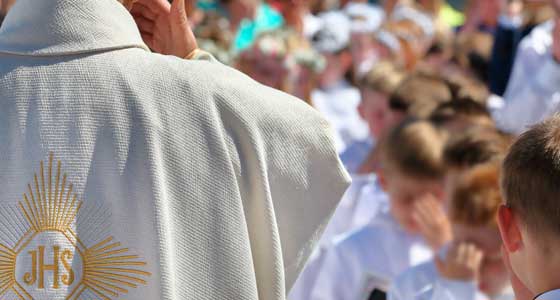Why Can Only Practicing Catholics Receive the Sacraments?

In establishing his covenant with the Israelites, God also established three different leadership roles: priests, prophets, and kings. The role of the Israelite priests was to offer sacrifices as God described to Moses and his brother Aaron; Aaron and his descendants were to be the priests. The prophets were God’s spokesmen; he commissioned them to proclaim his laws and to warn the Israelites of the consequences when they violated these laws. Beginning with Saul, God appointed kings over the Israelites to govern them as a nation.
Jesus fulfilled the Old Covenant by establishing a New Covenant, in which all three offices are present in himself. As priest, he offered the sacrifice of his body and blood on the cross, through which we receive his life, his grace. As prophet, he gave his teachings. As king, he claimed sovereignty over all nations of the world, mandating that all are obliged to recognize his reign.
These three roles are continued through the Catholic Church. Through the sacraments, by which Jesus gives his grace to mankind, the Church carries on the role of Christ as priest.
But for the sacraments to have effect—to give grace—they must include the aspects of prophet and king, of moral teaching and of governance.
In other words, for a sacrament to exist, it must mean something; this meaning is part of the teaching of Christ, preserved and explained by the Church. The sacrament of baptism, for example, not only gives grace but also involves the prophetic or teaching role of the Church, which teaches that that the recipient of baptism is cleansed of original sin, becomes a temple of the Holy Spirit, and is received as a member of the Church. Furthermore, the ritual governs how the sacrament is practiced, specifying the matter (water) and the form (words) needed for baptism, as well as the ordinary minister (priest or deacon) of the sacrament. The grace of the sacrament, its meaning, and its practice require all three roles of the Church: priest, prophet, and king. The same is true of all the sacraments: all give grace, all convey teachings of Christ and his Church, and all are governed by the Church.
This is why those receiving the sacraments (apart from baptism, of course) must, to the best of their ability, be practicing Catholics, accepting the role of Christ and his Church as priest, prophet, and king.
Denying these can prevent recipients from receiving the grace of the sacraments, and in some cases can even make a sacrament invalid. For example, Jesus said that in matrimony man and woman become one flesh, that no man could separate what God has joined, and that whoever divorces and remarries another commits adultery (Matt. 19:4-9).
If a man or woman (or both) deny the teachings of Christ and the Church regarding the indissolubility of marriage—if they vow to love and honor each other for life but in reality do not believe that marriage is for life— the vows are invalid, the sacrament of matrimony does not take place, and the marriage may later be annulled.
Finally, those who knowingly and willingly do not practice the Faith, but still presume to receive the sacraments, commit the mortal sin of sacrilege: treating holy things with less than the respect they deserve.
As St. Paul wrote in regard to receiving Holy Communion: “Whoever, therefore, eats the bread or drinks the cup of the Lord in an unworthy manner will be guilty of profaning the body and blood of the Lord. Let a man examine himself, and so eat of the bread and drink of the cup. For anyone who eats and drinks without discerning the body eats and drinks judgment upon himself” (1 Cor. 11:27-29).
Recent Posts
-
Are We Superior to the Early Christians?
If the early Church was the Catholic Church, why can’t we say that Christians just lost their way ea …Jul 15th 2024 -
Did the Early Christians Get Things Wrong?
You can find countless variations of the claim that early Christians believed Protestant things: …Jul 1st 2024 -
How to Respond When the World Tells Us We Can "Build Our Own Deity"
The necessity of revelation and of knowing God on his terms is not accepted in our culture today. A …Jun 22nd 2024









